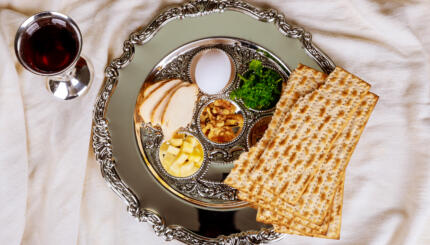Pesach Sheni, or Second Passover, is a date on the Jewish calendar that comes exactly one month after Passover. In ancient times, it was a make-up date for those who missed the Passover sacrifice made on the 14th of Nisan either because they were unable to travel to Jerusalem or because they were impure and therefore could not participate the first time around. Since Passover has not required a sacrifice since the Temple was destroyed in 70 CE, the date has been less significant from a ritual perspective, but some still find it spiritually compelling.
Origin of Second Passover
In ancient times, Passover was the most significant festival for the Israelites. The celebration looked very different from a modern Passover seder. Jews would travel from near and far to be together in Jerusalem on the 14th of Nisan where they would sacrifice a lamb or goat at the Temple. After sundown, they would take the animal back to their encampments and roast it, eating it with unleavened bread and bitter herbs as the Torah prescribed.
Coordinating an entire nation to enter a state of purity (which was required to enter the Temple and make a sacrifice) and come to Jerusalem all on the same day was no mean feat. In fact, it was virtually impossible. But Passover was so important that the Torah made a provision for those who were not able to make the sacrifice on the 14th of Nisan: They could make it up one month later, on the 14th of Iyyar. The provision is laid out in Numbers 9, where Moses is approached by several Israelites who are impure through contact with a corpse and unable to become pure again before the 14th of Nisan:
There were some men who were unclean by reason of a corpse and could not offer the passover sacrifice on that day. Appearing that same day before Moses and Aaron, those men said to them, “Unclean though we are by reason of a corpse, why must we be debarred from presenting the Lord’s offering at its set time with the rest of the Israelites?” Moses said to them, “Stand by, and let me hear what instructions the Lord gives about you.” And the Lord spoke to Moses, saying: “Speak to the Israelite people, saying: When any of you or of your posterity who are defiled by a corpse or are on a long journey would offer a passover sacrifice to the Lord, they shall offer it in the second month, on the fourteenth day of the month, at twilight. They shall eat it with unleavened bread and bitter herbs, and they shall not leave any of it over until morning. They shall not break a bone of it. They shall offer it in strict accord with the law of the passover sacrifice.”
Numbers 9:6–12
The passage in Numbers is of interest not only because it creates a make-up date for Passover, but also because it is one of only a few in which God amends divine law in response to a human concern. Another example, also found in the Book of Numbers, is when the five daughters of Zelophehad approach Moses because they wish to inherit their father’s estate. God changes divine law and allows daughters to inherit when there are no sons to do so.

Help us keep Jewish knowledge accessible to millions of people around the world.
Your donation to My Jewish Learning fuels endless journeys of Jewish discovery. With your help, My Jewish Learning can continue to provide nonstop opportunities for learning, connection and growth.
Pesach Sheni Today
Today, celebrating Passover does not require one to travel to Jerusalem, though Jews do express a wish to be in Jerusalem next year at the end of every Passover seder). Nor does it require one to be pure since it does not involve a sacrifice. For that reason, Pesach Sheni is more of a curiosity than a religious occasion. However, Jews do acknowledge it in their daily prayers by omitting the Tachanun prayer, a confessional that is normally recited after the Amidah during both Shacharit (morning) and Minchah (afternoon) prayers. Some, particularly those influenced by Hasidic thought, find Pesach Sheni an inspiring reminder of the grace and possibilities offered by second chances.



